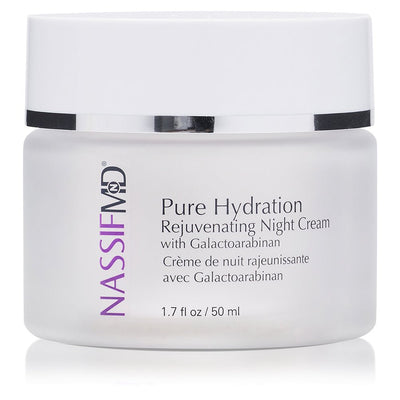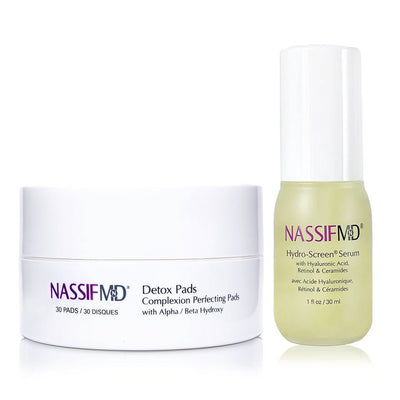How to Properly Hydrate Your Skin
Skin hydration is crucial for glowing, radiant, healthy skin, yet how to hydrate skin may feel elusive. Chances are, if your skin is dry, you’re focused on skin hydration, but did you know that dry skin isn’t the same as dehydrated skin? All skin types can become dehydrated, causing damage to the skin barrier.
Today’s article will focus on how to rehydrate skin and maintain it, no matter your skin type. We’ll cover how to treat dry skin internally, external solutions, and effective skincare products from NassifMD® facial plastic surgeon skincare.
Keep reading as we explore:
- How to keep skin hydrated with a daily routine
- Does drinking water help your skin? And other helpful lifestyle habits
- How to treat dry skin internally
- Hydrating ingredients to look for in skin hydration products
- Skin and face hydration mistakes
- Best way to hydrate skin in the winter or dry seasons
- Hydrating skin products from NassifMD® Skincare
Building a Skin Hydration Routine
Each person’s skin has its own needs, but hydrated skin is essential for everyone. Hydrated skin looks smooth, supple, and radiant. You may also notice fewer fine lines and wrinkles when the skin becomes optimally hydrated.
Signs of dehydrated skin include:
- Dullness
- Dark circles under the eyes
- Increased fine lines and wrinkles
- Decreased skin elasticity
A hydrating skincare routine includes keeping the body hydrated internally and targeted hydrating skincare formulas.
Lifestyle Changes for Skin Hydration
How to get hydrated naturally requires a foundation of lifestyle strategies and common sense. Making some simple changes can translate to big results in how your skin looks and feels.
The first tip is to drink enough water. Internal hydration translates to skin hydration. The benefits of drinking water for your skin include increased plumpness, elasticity, and shine.
In addition to drinking water and other hydrating benefits, consider these lifestyle tips to support hydrated skin:
- Limit hot showers and baths – Bathe for shorter times and less frequently. Opt for warm water
- Eat a mineral-rich, whole-food, anti-inflammatory diet – Fresh foods are hydrating and contain electrolyte minerals that support water balance in the body and skin
- Limit or eliminate coffee and alcohol – Caffeine and alcohol can be dehydrating for the body and skin
- Protect the skin from the sun – Sun damage can contribute to skin dehydration. Stay in the shade or wear protective clothing or sunscreen
- Use a silk, bamboo, or satin pillowcase – These fabrics absorb less water from the skin
- Use a humidifier – When living in a dry climate or when indoor air is dry, using a humidifier adds more moisture to the air, helping to hydrate the skin
Best Ingredients for Hydrating Skin
Not just any skin hydration product will do. Choose science-backed, active ingredients, such as hyaluronic acid, glycerin, and ceramides.
Hyaluronic Acid
Hyaluronic acid is the ultimate skin hydrator! You’ll find it as a primary ingredient in hydration skincare.
Hyaluronic acid is a natural molecule (glycosaminoglycan) made by the body and concentrated in the skin. Like many beneficial skin compounds, it declines with age and contributes to the signs of aging, including fine lines and wrinkles.
As a topical ingredient, hyaluronic acid deeply penetrates the skin and binds to water. It draws water into the skin, locking it there to increase hydration and improve the its appearance. Further, hyaluronic acid has synergistic benefits when combined with other active skincare ingredients.
Glycerin
Glycerin is another skincare ingredient with hydrating, moisture-retention properties. Glycerin is composed of glycerol molecules, which are part of the natural fatty molecules in the body and skin barrier. A healthy skin barrier helps keep impurities out of the body and moisture locked inside.
One clinical trial suggests a skincare product with 1% hyaluronic acid and 5% glycerin improves skin hydration in just 24 hours. However, when using topical products at home, you may notice an almost instant plumping result from these ingredients.
Ceramides
Often, dehydration damages the skin barrier, which can lead to more water loss. Luckily, the damage isn’t permanent, and the skin cells and barrier can regenerate. The best way to stay hydrated is to regularly apply topical hydrating skincare ingredients.
Ceramides are another lipid-based molecule essential for a healthy skin barrier. Without them, the skin is more prone to dehydration, rashes, and chronic skin conditions.
Common Skin Hydration Mistakes
While skin hydration is a relatively simple concept, it’s possible not to get the full hydrating benefits of your lifestyle and skincare routine. Here are a few common skin hydration mistakes and quick fixes to optimize your routine.
- Relying solely on skincare products. Optimal skin hydration requires more than hydrating skincare products; internal, whole-body hydration is equally important. Remember to prioritize drinking water as a daily habit.
- Over-exfoliating. Exfoliation is beneficial for removing dead skin cells and promoting cellular turnover (which makes your skin glow!), but more isn’t always better. Be sure to adjust your exfoliating routine to your skin type to protect skin barrier function.
- Applying skincare in the wrong order. You’ll get the maximum benefits from your skincare products when you follow this order of application.
Seasonal Hydration Tips
When discussing skin hydration, we must recognize seasonal factors. When you live in a hot, dry climate (especially in the summer) or a cold, dry indoor environment (especially in the winter), your skin is more prone to dehydration.
Forced indoor heat and low humidity cause increased evaporation from the skin and can leave it feeling dry, chapped, and irritated. Further, severely dry skin may appear more wrinkled and crepey.
It's important to think about hydration and skin in these environments. Here are some of the best ways to hydrate:
- Use a humidifier to add humidity to indoor air
- Limit long hot showers
- Moisturize immediately after a shower or bath
- Regularly use hydrating ingredients and serums, including hyaluronic acid
- Try skin slugging
- Invest in hydrating products from NassifMD® Skincare
Skin Hydration Product Guide
Expertly formulated by Dr. Paul Nassif, you’ll discover hydrating ingredients in synergistic formulas throughout the NassifMD® Skincare line. Here are some of our favorites to use as part of a hydrating skincare routine.
Cleanser: NassifMD® Pure Hydration Facial Cleanser refreshes, brightens, and softens the skin without stripping it of moisture. It contains matcha and squalane along with gentle cleansers.
Toner: NassifMD® 3HA Hydrating Facial Mist with three forms of hyaluronic acid. Use after cleansing or anytime your skin needs a hydration refresh.
Serum: NassifMD® Hydro-Screen Serum repairs, firms, protects, and hydrates the skin with hyaluronic acid, ceramides, and antioxidants.
Moisturizers: NassifMD® Soft Focus Hydrating Day Cream perfects and plumps the skin with hydration. It’s perfect for daytime wear under makeup and offers another layer of hyaluronic acid.
Wondering how to hydrate skin overnight? NassifMD® Pure Hydration Night Cream plumps, repairs, and deeply hydrates the skin while you sleep with galactoarabinian, aloe, and vitamin C.
NassifMD® Skin Barrier Balm deeply hydrates and protects dry, sensitive, and irritated skin with hydrating plant extracts, oils, antioxidants, and nutrients.
Sunscreen: NassifMD® Protect & Hydrate protects, hydrates, and tints the skin while providing SPF 44 and another hyaluronic acid layer.
Body: NassifMD® Crepe Inhibitor Triple Action Body Butter moisturizes, firms, and soothes the skin with shea butter, peptides, and plant extracts.
NassifMD® Hydro-Screen Souffle hydrates, nourishes, and plumps the face and body with an intensely hydrating formula, including ceramides and hyaluronic acid.
Skin dehydration doesn’t just occur with dry skin; everyone is at risk. You can keep your skin hydrated with simple lifestyle habits and NassifMD® facial plastic surgeon skincare.
References
- Juncan, A. M., Moisă, D. G., Santini, A., Morgovan, C., Rus, L. L., Vonica-Țincu, A. L., & Loghin, F. (2021). Advantages of Hyaluronic Acid and Its Combination with Other Bioactive Ingredients in Cosmeceuticals. Molecules (Basel, Switzerland), 26(15), 4429.
- Chen, H. J., Lee, P. Y., Chen, C. Y., Huang, S. L., Huang, B. W., Dai, F. J., Chau, C. F., Chen, C. S., & Lin, Y. S. (2022). Moisture retention of glycerin solutions with various concentrations: a comparative study. Scientific reports, 12(1), 10232.
- Milani, M., & Sparavigna, A. (2017). The 24-hour skin hydration and barrier function effects of a hyaluronic 1%, glycerin 5%, and Centella asiaticastem cells extract moisturizing fluid: an intra-subject, randomized, assessor-blinded study. Clinical, cosmetic and investigational dermatology, 10, 311–315.
- Lee, S. H., Jeong, S. K., & Ahn, S. K. (2006). An update of the defensive barrier function of skin. Yonsei medical journal, 47(3), 293–306.
- Akiyama, F., Takahashi, N., Ueda, Y., Tada, S., Takeuchi, N., Ohno, Y., & Kihara, A. (2024). Correlations between Skin Condition Parameters and Ceramide Profiles in the Stratum Corneum of Healthy Individuals. International journal of molecular sciences, 25(15), 8291.






















